News
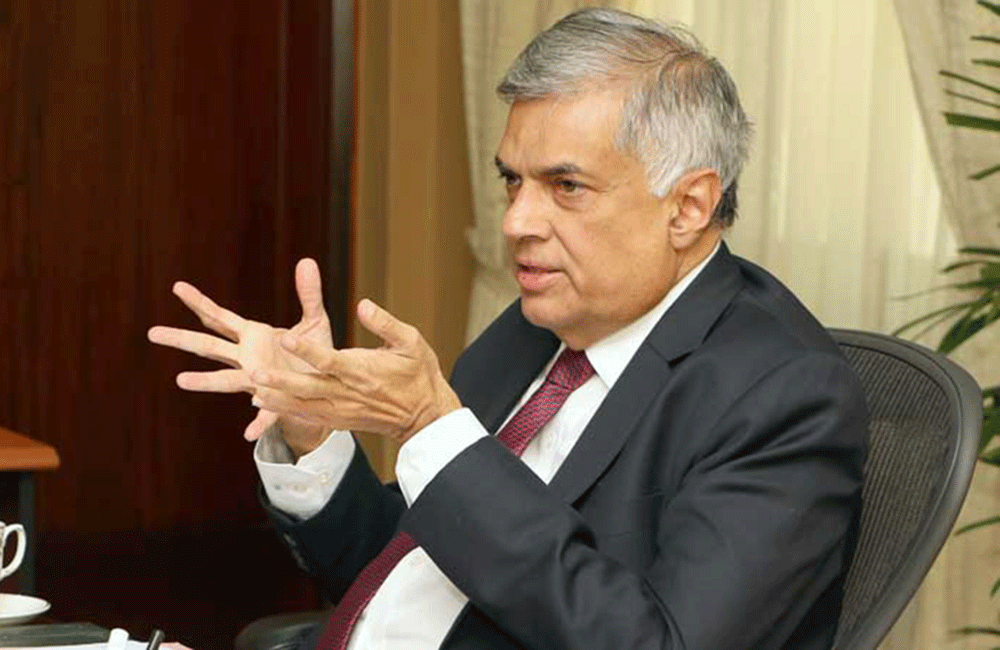
Sri Lanka political crisis "Death Blow" to economy: Ranil
(AFP) - Sri Lanka's prime minister said Thursday the country was struggling to pay back its ballooning foreign debt, blaming a recent political crisis for dealing a "death blow" to the economy.
Ranil Wickremesinghe said his government was scrambling to raise $1.9 billion to help service a first debt payment of $2.6 billion, that is due on Monday.Sri Lanka faces $5.9 billion in foreign debt repayments in 2019, a record for the cash-strapped island.
The country lost $1 billion in foreign reserves during a power struggle between Wickremesinghe and President Maithripala Sirisena in late 2018.
Sirisena sacked Wickremesinghe in October and later dissolved parliament to quell any opposition, but Sri Lanka's courts deemed the move unconstitutional.
Wickremesinghe was reinstalled 51 days later but not without a cost, the prime minister said.
"We are yet to quantify the losses, but it was a death blow to an economy that was struggling to recover," Wickremesinghe told parliament.
Three global ratings agencies downgraded Sri Lanka during the crisis, making it more expensive for the Indian Ocean nation to access foreign loans.
Sri Lanka hopes to raise $1 billion from the international debt market, another $500 million from China and Japan and a further $400 million from the Reserve Bank of India.
Wickremesinghe has dispatched his finance minister to Washington to try to revive a loan arrangement with the International Monetary Fund that was suspended during the chaos.
Sri Lanka narrowly averted defaulting on its sovereign debt after Wickremesinghe's reformed administration introduced a plan late last month to meet urgent spending obligations for the first four months of 2019.
Sirisena came to power in 2015 with the help of Wickremesinghe's United National Party but personal and political clashes came to a head before the October sacking.
(Except for the headline, this story has not been edited by isis.lk staff and is published from a syndicated feed.)
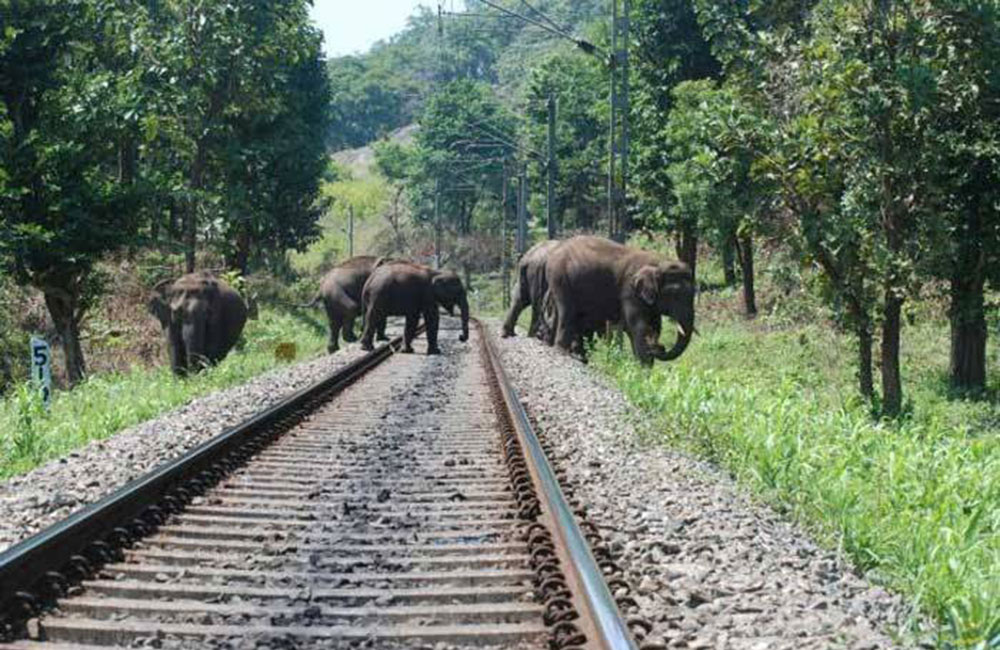
Elephants slaughtered by Sri Lankan trains a disturbing new trend
Blessed with wondrous natural beauty and exotic wildlife, Sri Lanka has quickly become one of the world's most popular tourist destinations.
But few tourists to the Indian Ocean island know that the massive development launched across the country to cater to their needs has contributed to a tragic outcome for Sri Lanka's endangered elephant population.
A growing number of elephants in Sri Lanka are being slaughtered by fast-moving trains, as the animal's natural habitat has rapidly shrunk over the past decade.

A train is derailed after striking an number of elephants. (Supplied)
Terrible and graphic images of pregnant female elephants and young calves killed by passenger trains have repeatedly emerged from Sri Lanka last year.
According to Department of Wildlife figures, 15 elephants were killed by trains in 2018, almost more than double the previous year. Total elephant deaths in 2018 numbered 273, up from 256 in 2017.
Leading wildlife experts are concerned the Sri Lankan government is not doing enough to protect elephants, which are a huge drawcard for millions of tourists who visit the country.
Accusatory fingers are also being pointed at ill-disciplined train drivers failing to obey speed limits during the night, when elephants might be seeking warmth from the tracks.
"The incidents have grown in number in the last several years, it has become much more frequent," elephant welfare campaigner Srilal Miththapala told nine.com.au.
"Over the last decade there has been a lot of development, a lot of clearing of forest and a lot of villages being settled in areas which used to be elephant territory.
"This has disrupted the movements of elephants, especially the males who are much more mobile … now they must cross villages and tracks, and altercations take place.
Mr Miththapala, who also sits as vice president of the Tourist Hotels Association of Sri Lanka, fears mostly roaming males are being killed by trains, potentially affecting the male-female ratio of Sri Lanka's elephant population.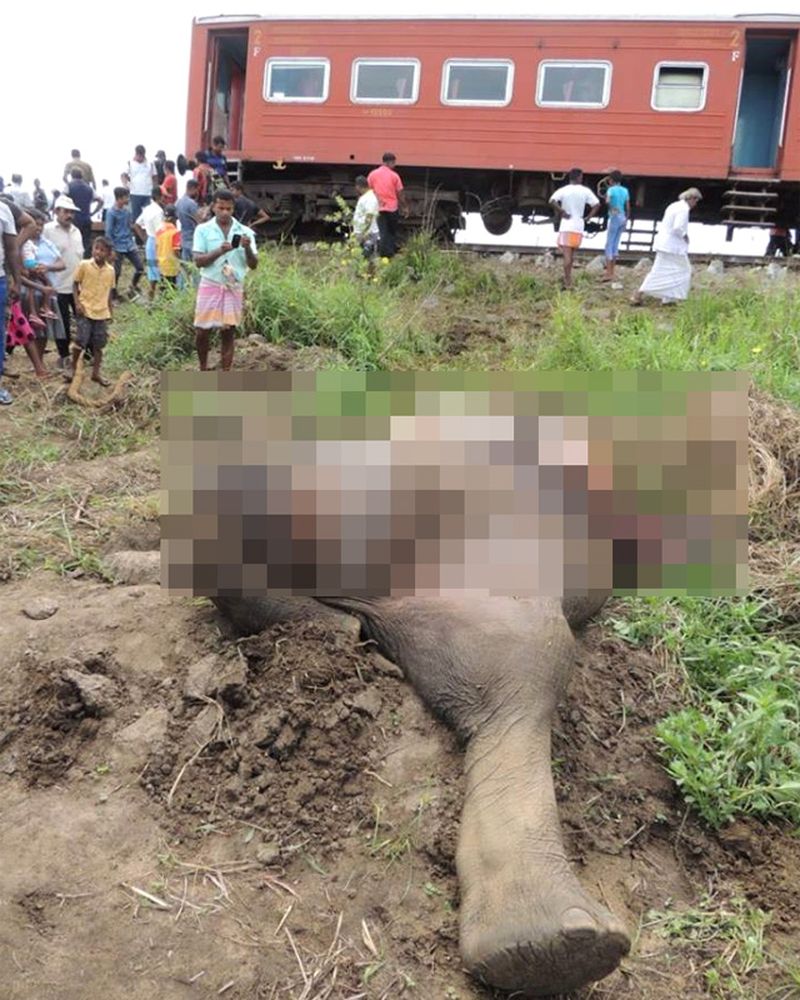
Sri Lankans look at an elephant killed by a train. (Supplied)
Trains travelling from Colombo and the west across central Sri Lanka towards the eastern coastal cities of Trincomolee and Batticaloa have been involved in a high number of elephant collisions.
Mr Miththapala has proposed the government builds an early warning signal track system of flashing lights and sirens in areas where elephants are known to move.
Experts believe that in recent times elephants have become too accustomed to humans, as wild and manmade environments become increasingly fused together.
"The elephants seem to be acclimatised to the train noise," Mr Miththapala said. "They try to scatter, but when there are babies and mothers they sometimes get hit."
In one of the worst recent incidents, four elephants including an 80-day-old unborn elephant died in October after they were run over by a night mail train.
Four elephants were mown down and killed a month earlier.
Despite the tourism boom in Sri Lanka since the country's 26-year civil war ended in 2009, Mr Miththapala said the government has not done enough to ensure elephants are protected for future generations.
"The appetite and will [from politicians] is not there to remedy this problem," he said.
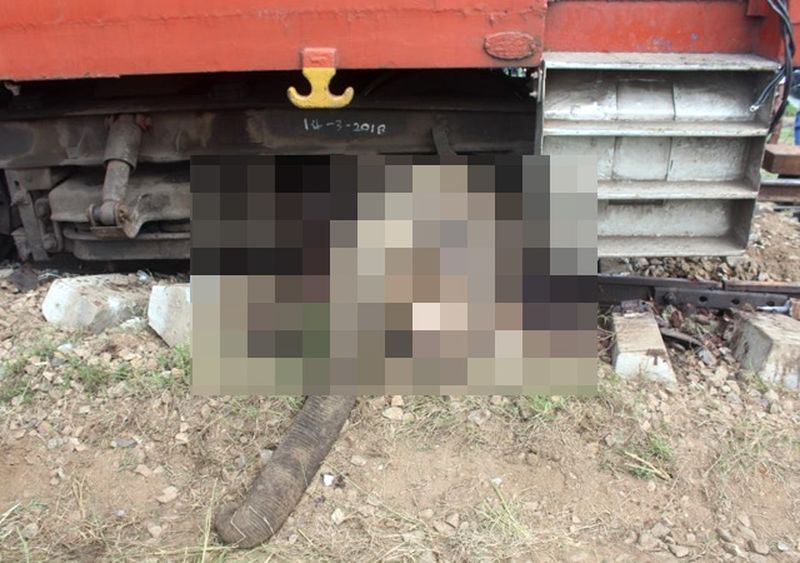
A Sri Lankan elephant is dead and trapped under a train. (Supplied)
He said the Department of Wildlife and Department of Transport "don't see eye to eye" on trains killing elephants.
"Both their mandate are different. The Department of Wildlife is there to protect animals, while [the Department of Transport] is there to ensure efficient travel and services."
Researchers estimate there are probably around 6500-7000 wild elephants in Sri Lanka. It is a "healthy" number, Mr Miththapala said, but it risks masking several serious issues that could have dire consequences.
"The current picture is rather gloomy. The numbers [of elephants] is always up for debate," Mr Miththapala said.
"Given the shrinking habitat of the elephants ... we feel the current capacity [of 7000] is too high, that the country can't sustain this level of development and that number of elephants."
Studies are also currently underway to better understand the male-female ratio in the elephant population, with fears the number of males is dangerously low.
The World Wide Fund for Nature (WWF) lists the Sri Lankan elephant as an endangered species.
The Sri Lankan elephant population has fallen almost 65 percent since the turn of the 19th century, according to WWF.

Hybrid buses from China to upgrade public transportation
Sri Lanka is in talks with China to import hybrid buses to upgrade the country's public transport sector, State Minister of Transport and Civil Aviation Ashoka Abeysinghe said at a media briefing.
Abeysinghe added that he was in discussions with Chinese companies, which manufacture hydrogen powered buses and hybrid buses, and the procurement plan to purchase the buses had been finalized.
The minister said they hope to expedite the process and open the tenders in the coming 28 weeks.
"I went to China a couple of months ago and visited the Chinese companies," the state minister said.
"We are looking at hybrid buses as we do not have enough charging stations for electric buses," he added.
Sri Lanka is looking to boost its public transport infrastructure, particularly in Colombo, amid rising tourist numbers and increased road congestion.
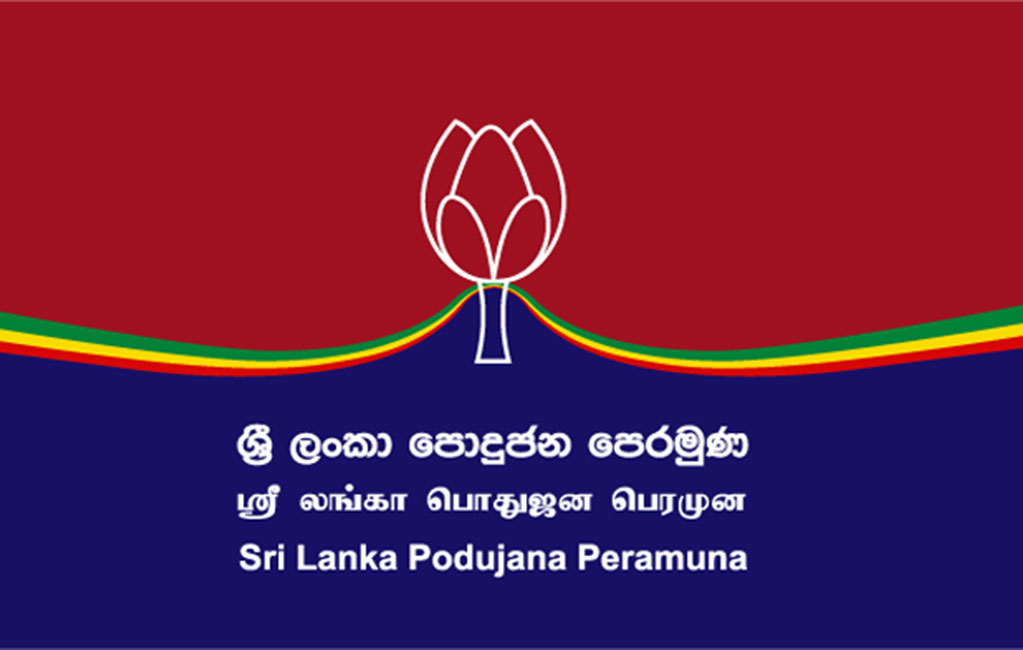
Pohottuwa CMC member K.G Kulatissa arrested for CPC unrest
Pohottuwa politico and Colombo Municipal Council (CMC) member K.G Kulatissa has been arrested by the Colombo Crimes Division (CCD) in connection to the unrest at the Ceylon Petroleum Corporation (CPC) on October 29.
The Police arrested him for being part of an illegal gathering, acting in a disorderly manner and obstructing the duty of Police Officers. He will be presented to the Aluthkade No. 1 Magistrates Court today.
On CPC staffer lost his life during the fracas after the group attacked the former Minister of Petroleum Arjuna Ranatunga, prompting one of his guards to fire at the crowd. CCTV footage later revealed the mob was led by several local government members of the SLPP.
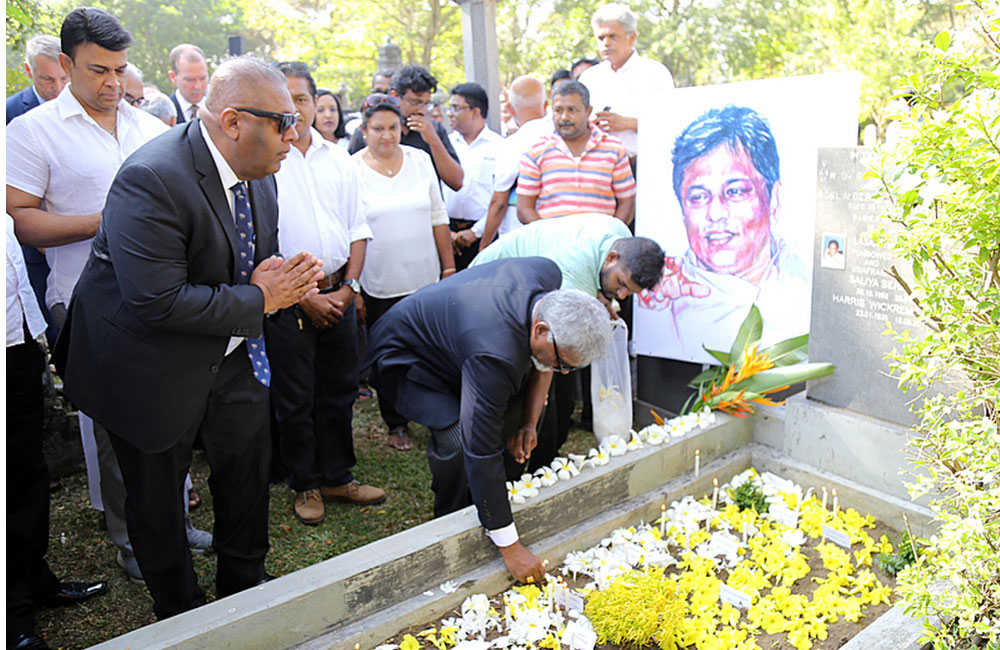
Sri Lanka marks decade since journalist murder amid justice calls
Sri Lankan journalists on Tuesday paid tribute to anti-establishment editor Lasantha Wickrematunge 10 years after his murder by a suspected government death squad that came to symbolise a deadly decade-long crackdown on the country’s media.
Just days before he was due to give evidence against the brother of the country’s then strongman leader Mahinda Rajapakse, two assailants on motorcycles blocked the car of the 50-year-old editor of the Sunday Leader newspaper before smashing the windows and stabbing him in the head.
The assassination is one of many unresolved killings of journalists carried out during Rajapakse’s decade in power, which also saw a 37-year conflict with Tamil separatists brought to a brutal conclusion.
Friends, family and colleagues of Wickrematunge placed flowers and candles on his grave at the Colombo General Cemetery.
White cards with Wickrematunge’s name and those of 18 other journalists were also put among the golden trumpet flowers and white frangipani blooms.
A message from Lal Wickrematunge — the dead journalist’s brother who lives in Australia — was read out, saying the family was also grieving for other journalists killed by unidentified assassins.
It said many journalists from the minority Tamil community were killed “during the darkest period in our nation’s history” — the four-decade civil war, ended by government forces when they crushed the rebel Tamil Tigers in 2009.
The murdered Wickrematunge was a critic of that military campaign, which allegedly massacred 40,000 ethnic Tamils.
“Reconciliation and closure will not be possible without prosecution,” his brother said.
Before his death, Wickrematunge had revealed corruption in a multi-million dollar purchase of second-hand MiG planes from Ukraine implicating then secretary to the ministry of defence, Gotabhaya Rajapakse — Mahinda Rajapakse’s brother who was president at the time.
The editor was killed days before he was due to give evidence.
After Rajapakse lost a 2015 election, a breakthrough in the Wickrematunge case saw investigators tell a Sri Lankan court that army spies were responsible for his killing.
A former army commander accused Gotabhaya of running a secret unit used to target journalists and dissidents during his brother’s presidency, during which rights activists say dozens of journalists and media workers were killed.
Gotabhaya has denied any link to the killings. He remains under investigation for corruption related to the MiG deal.
(AFP)
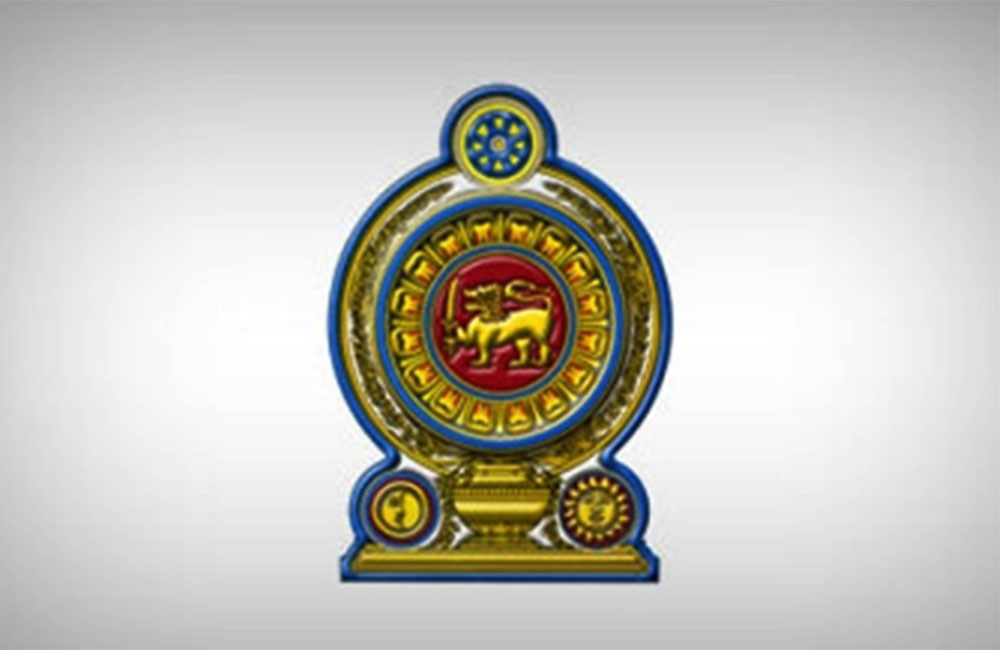
Four new governors to be appointed today
Governors for four new provinces are to be appointed today (07). The appointment of new governors will be for Sabaragamuwa, Uva, Northern and Southern provinces.
On December 31, President Maithripala Sirisena had instructed all governors to tender their resignations. It is believed the President had done so in order to appoint those loyal to him instead.
New Governors appointed for five provinces were therefore sworn in before President Maithripala Sirisena at the Presidential Secretariat on January 4.
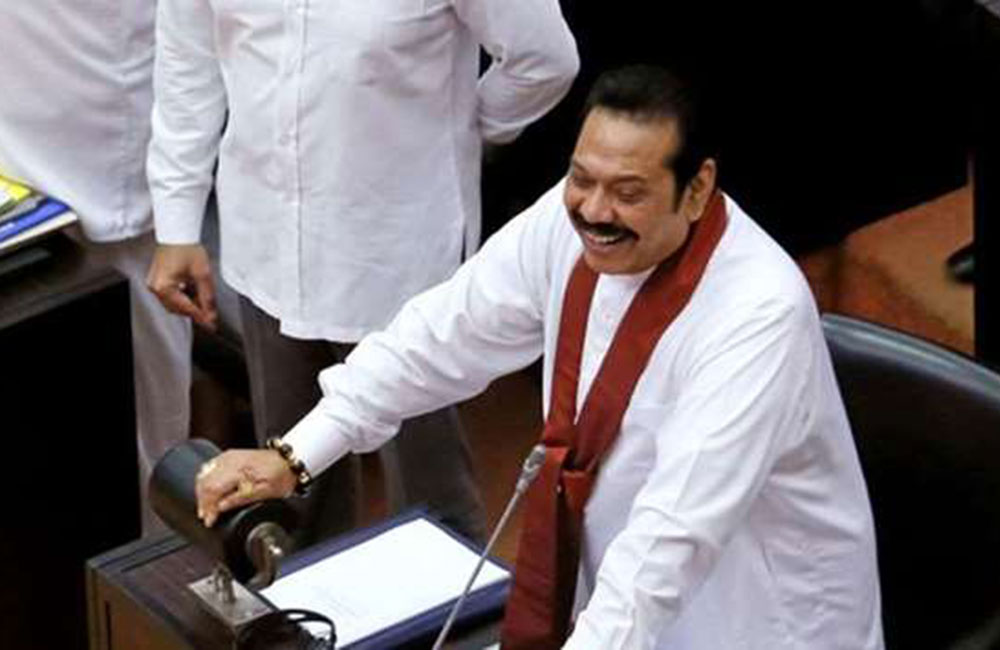
Mahinda Rajapaksa will be recognized as the Opposition Leader: Deputy Speaker
Deputy Speaker Ananda Kumarasiri reading out a statement conveyed by Speaker Karu Jayasuriya notified the parliament that United People's Freedom Alliance (UPFA) MP Mahinda Rajapaksa will be recognized as the new leader of the opposition.
The Deputy Speaker made this statement at the parliamentary session held today (08).
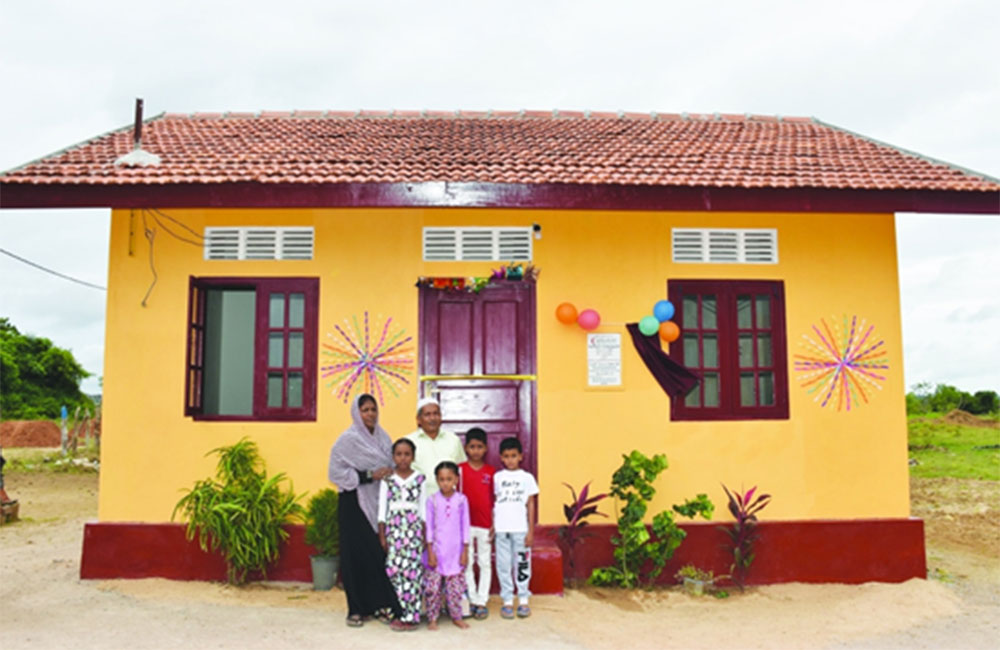
QRCS sets up residential village in Sri Lanka
Qatar Red Crescent Society (QRCS) has completed a project to establish a residential village for 800 internally displaced people (IDPs) in Sri Lanka.
At a total cost of $486,619 (nearly QR1.8mn), donated by a Qatari benevolent person who requested anonymity, the new village is located in Riditenna, Valaichchenai Province, eastern Sri Lanka
The project comprised 56 2-BHK housing units, each with a 250-litre water tank, a mosque, public school, health unit, and two shops. An artesian water well was dug and equipped with a solar-powered pump and a 10,000-litre tank.
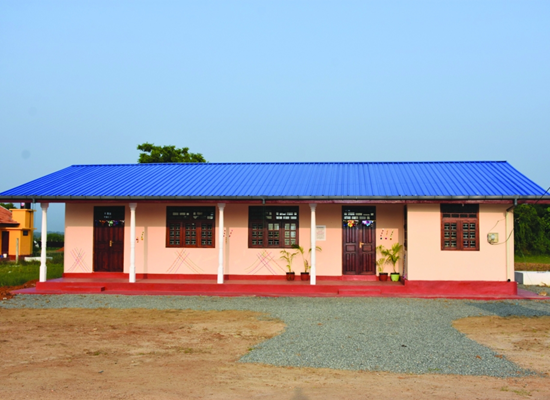
The health facility will later be handed over to the government to ensure its sustainability
Done in co-operation with Serendib Foundation for Relief and Development, the project provides a convenient environment for the populations that were displaced due to armed conflict. Now, they can return to their home villages after years of displacement.
In February 2018, a delegation from QRCS held the groundbreaking ceremony for the project, which was attended by the Minister of Rehabilitation and Resettlement, Mayor of Batticaloa, head of municipality, local community leaders, and the project's manager.
Under a public tender, the contract was awarded to the winning construction company. To ensure more transparency, onsite supervisors were appointed and weekly follow-up visits were made by QRCS personnel and the partners.
The houses, the mosque, and the school were fully furnished, and the health unit has all the needed medical equipment. After the end of operation, the health facility will be handed over to the government to ensure its sustainability.

The project included a park and play area for children
Sri Lanka suffered an armed conflict that displaced thousands of people to neighbouring provinces, where they lived in makeshift shelters.
As the conflict came to an end, they started returning home just to find totally destroyed houses and public utilities.
An integrated repatriation scheme was adopted by the government to reconstruct the damaged areas, rehabilitate infrastructure, and support livelihoods.
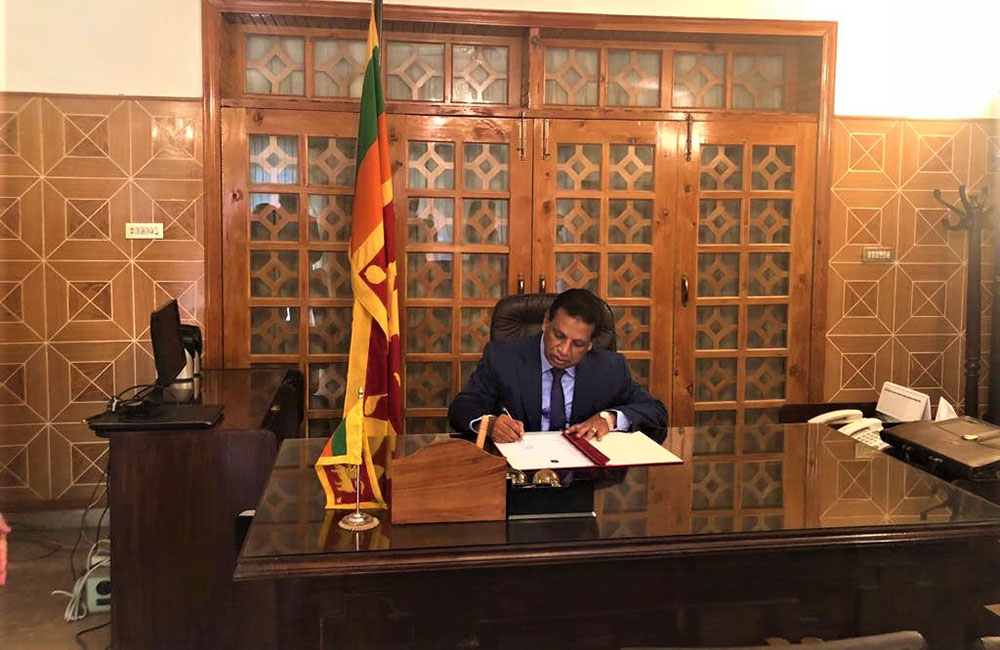
Sri Lanka seeks removal of non-tariff barriers to improve trade with Pakistan
Sri Lanka has sought the removal of non-tariff barriers (NTBs) and other issues to improve trade with Pakistan.
Addressing the Lahore Chamber of Commerce and Industry on Monday, High Commissioner of Sri Lanka to Pakistan Noordeen Mohamed Shaheid said that though the two countries signed Free Trade Agreement (FTA), certain issues including NTBs need to be resolved to improve trade between the two countries.
The envoy said Pakistan and Sri Lanka had signed the FTA in June 2005 under which the private sectors of both the countries were provided with greater opportunities to take trade and economic relations to next level. From 2005 onwards, there was significant increase in bilateral trade, he said. “But it is also a fact that the two countries could not succeed in fully exploiting the trade potential,” he added.
The Sri Lankan high commissioner said there was a vast scope for the expansion of bilateral between Pakistan and Sri Lanka.
He urged that both countries should introduce new products for trade and make business-to-business contacts stronger. “Sri Lanka offers huge opportunities in various sectors of economy,” he added. He said though terrorism remained a big challenge for Sri Lanka, but today it a peaceful country. “We have defeated terrorism due to immense support of Pakistan,” he said.
Speaking on the occasion, LCCI President Almas Hyder said Sri Lanka was at the take-off stage and Pakistani business community should avail this great opportunity. “Both Pakistan and Sri Lanka are members of Saarc and enjoy friendly relations based on historical linkages.
Cooperation between two countries especially in defence sector has played major role in further strengthening the mutual ties,” he added.
Earlier, National Assembly Deputy Speaker Qasim Khan Suri also visited the LCCI and said the government was making all-out efforts to overcome the inherited economic crisis. “The business community has a key role in economy and economic challenges will be tackled with their cooperation,” he said.

Government to pay compensation for crop losses due to Armyworm infestation
The government has taken measures to provide relief to the farmers for the crop damage caused by the fall Armyworm.
The Minister of Agriculture, P. Harrison said the Ministry of Agriculture has allocated a sum of Rs 50 million to compensate for the damage caused by the caterpillar infestation.
The maize and sugar cane cultivation in Anuradhapura, Ampara and Monaragala has been badly damaged by due to the caterpillar infestation.
Minister P. Harrison engaged in a tour of the Nachchaduwa area in Anuradhapura yesterday to firsthand observe the infestation and evaluate the damage to the crops, especially paddy fields.
Speaking to media following the tour, the Minister said the Agriculture Ministry has taken steps to control the fall armyworm infestation by natural as well as chemical methods and has introduced three types of chemicals.
Secretary to the Agriculture Ministry KDS Ruwanchandra said Sri Lanka, as well as other countries, has not been able to completely eliminate the fall armyworm infestation but the insect can be controlled with the chemicals introduced by the Ministry and the Ministry is taking the maximum effort to prevent the caterpillar infestation.
According to the UN Food and Agriculture Organization (FAO), in the larval stage, the FAW causes damage to crops, feeding on more than 80 plant species. Although the caterpillar primarily attacks maize, it can also destroy rice and sorghum as well as cotton and some vegetables and up to 1000 acres in one day.
The moth can fly up to 100 km per night and the female moth can lay up to 200 eggs at one time. The suppression of the insect was a challenge to every country they were reported, due to their ability to quickly adapt to insecticides.
The Agriculture Department recommends a combined application of chemical and natural methods as soon as the caterpillar infestation is observed. (Colombo Page)

Sri Lanka Technological Campus partners with 'EDEX 2019'
In a groundbreaking initiative, Sri Lanka Technological Campus (SLTC), Sri Lanka’s fastest growing university, has partnered as the Exclusive Platinum Plus sponsor of the EDEX Higher Education Expo 2019, the country’s largest education exhibition.
The EDEX Expo is to be held from January 18 – 20 at the BMICH in Colombo and 25-26 at the Kandy City Centre. This partnership is indicative of the commitment SLTC has towards providing greater opportunities to a wider cross-section of post-secondary students of Sri Lanka to excel in their higher education and to meet the expectations of their future employers.
The official signing ceremony was held in the presence of Kumarasinghe Sirisena – Group Chairman Sri Lanka Telecom PLC, Eng. Ranjith G Rubasinghe – President/ CEO of SLTC, Eng. Ranjith Gunawardena - Director- Operations, SLTC, Mahesh De Silva - Head of Finance, SLTC and Mithila Mendis - Secretary Royal College Union, Mahinda Galagedara - Chairman EDEX, Bimal Perera - Secretary EDEX, and other officials.
“One of SLTC’s founding objectives was to produce globally employable graduates who are capable of uplifting the quality of life of their communities.EDEX Expo has also embarked on this initiative with a similar objective of empowering Sri Lankan youth to be globally competitive. Going forward, we are happy that with this partnership we could jointly foster these objectives," SLTC Chairman Kumarasinghe Sirisena said.
Since 2015, SLTC has striven to offer unparalleled higher education and research opportunities in the fields of Engineering, Technology and Business Management.
Through this partnership with EDEX, SLTC hopes to encourage students to visit their stall and avail themselves of the amazing offers and scholarships that are on offer. Aspiring and future students can also speak with SLTC’s faculty and student leaders for further information on what the Campus has to offer in Engineering, Technology, Professional Studies, Business and Graduate Studies.
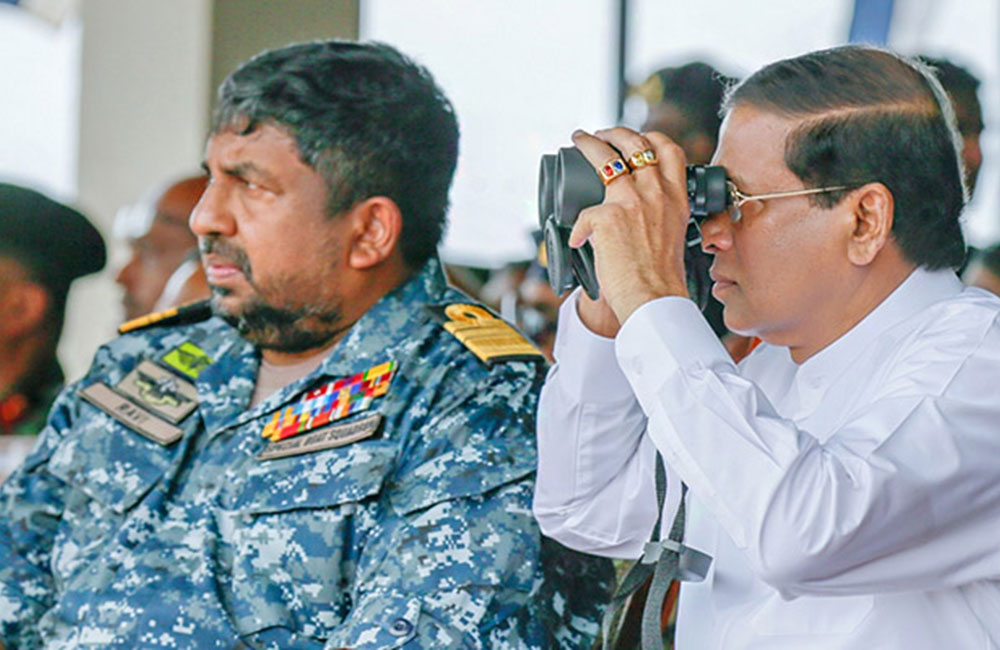
SL Navy top brass in “sinister plot” against investigators and witness
Details have emerged of senior Sri Lankan naval officers planning to harm the chief investigator and key witness in high profile cases of abduction, torture and extrajudicial killings.
Investigators of the police Criminal Investigation Department (CID) have discovered the details following the arrest of two navy intelligence officers.
NMW Janaka and ASN Tony arrested at the Colombo Fort magistrate court premises on 20 December, for acting in a suspicious manner, have told CID investigators that they were sent by a chief naval intelligence official to spy on Inspector of Police Nishantha Silva and those who provided evidence against navy officers.
The two arrested naval intelligence officers have alleged that they were detailed by Director Naval Intelligence, Captain Sanjeewa Premaratne.
“This is a sinister plot to assassinate the investigator and key witness as credible evidence have emerged of those in top most places in the navy being involved in mass crimes,” said an official familiar with ongoing investigations.
Police Inspector Silva briefing Fort Magistrate Ranga Dissanayake of the findings had told that the navy spies were involved in a plan to kill him.
The inspector is the lead investigator for several high-profile cases of serious crimes where senior military and navy officers have been named as suspects.
In one case of abducting, torturing and forcibly disappearing 11 males, the key suspects are high ranking navy officers.Many of them have been released on bail and reinstated by the navy with promotions.
The country’s top military officer Admiral Ravindra Wijegunaratne who allegedly assisted a suspect to avoid arrest and threatened a witness with death has also been released on bail.
A key witness speaking to JDS under strict condition of anonymity said that the admiral and several other officers who have access to sophisticated surveillance equipment and lethal weapons pose a grave threat.
“One suspect Sumith Ranasinghe was promoted to the post of commodore after his release. Although he is in charge of land operations, former navy commander Sirimevan Ranasinghe by a confidential letter has requested directors loyal to him to deploy Ranasinghe in intelligence. He is given an armed security and has the facility to spy on telephone conversations of navy officers who gave evidence against him.”
Top officer questioned
The CID had also questioned Director Naval Land Operations, Rear Admiral Udeni Indranatha Serasinghe on December 2 about giving promotions to suspect officers under bail conditions.
Investigators have learned that orders was given by Chief of Defence Staff Ravindra Wijegunaratne, Former Navy Commanders Wasantha Karannagoda and Sirimevan Ranasinghe.
In a two hour long confidential testimony to the Fort magistrate on the same day, a key naval witness had provided details into the torture and disappearance of the 11 males abducted in the suburbs of Colombo.
Lieutenant Commander Krishan Welagedara had also told the magistrate of threats to him by suspects released on bail.
Magistrate Ranga Dissanayake had directed the CID to request court to withdraw the bail order if adequate evidence can be found of the suspect navy officers posing a threat to witness.
The president's hand
Earlier, efforts by President Maithripala Sirisena to remove Nishantha Silva from investigations on the request of Admiral Wijegunaratne failed due to an outcry by local and international rights activists.
Several navy, army and police officers including those of intelligence units have been named as suspects in the assassination of Sunday Leader Founding Editor Lasantha Wickrematunge, abduction and torture of The Nation Former Deputy Editor Keith Noyahr, assault on 'Rivira' Former Editor Upali Tennakoon and his wife, abduction and disappearance of Journalist Prageeth Eknaligoda and the killing of rugby star Wasim Thajudeen.
Nishantha Silva is the chief investigator in most of those cases. (JDS Lanka)
Page 361 of 526